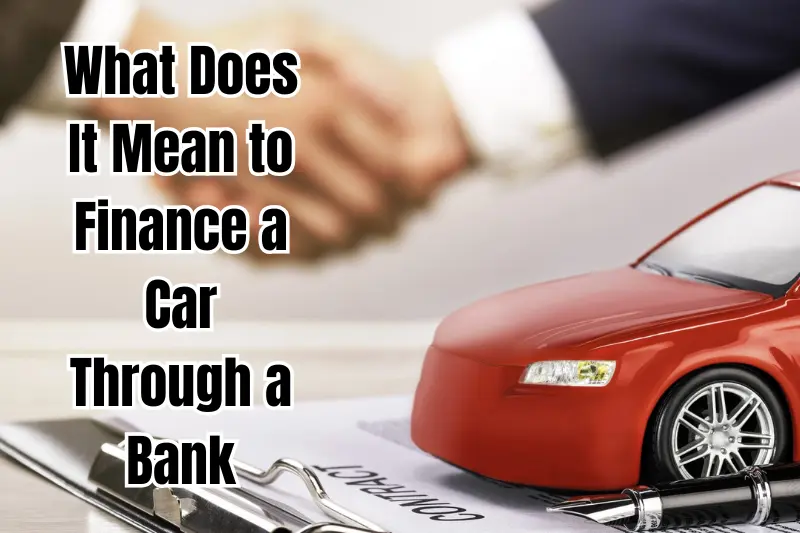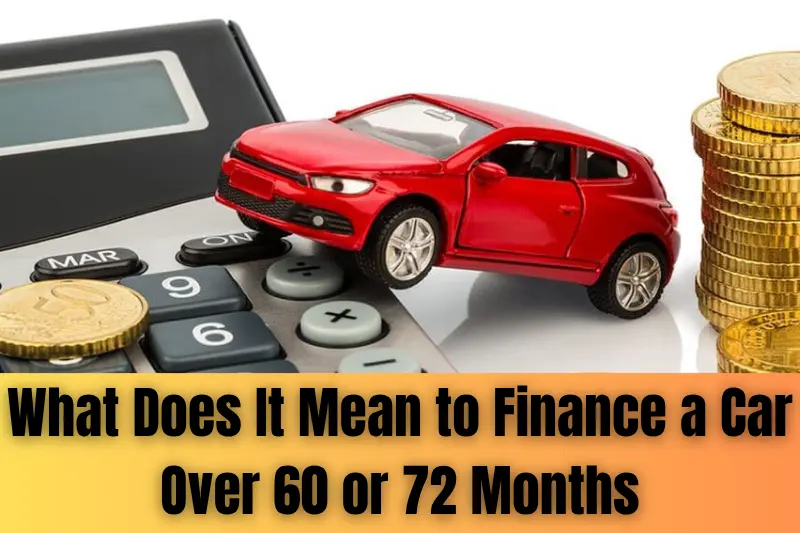Buying a car is exciting—but it can also be confusing, especially when you hear terms like car financing. So, what does it mean to finance a car? In simple words, it means you borrow money to buy the car now and pay it back in small amounts every month.
Many people choose this option because they don’t want to—or can’t—pay the full price upfront. If you’re thinking about getting a car but aren’t sure how financing works, don’t worry. In this guide, we’ll explain everything you need to know about what does it mean to finance a car, step by step.
What Does It Mean to Finance a Car Through a Bank

Financing a car through a bank means you borrow money from the bank to buy the car, then pay it back in monthly payments. This is a popular and trusted way to finance a car.
How Bank Car Financing Works
You apply for a car loan from a bank.
- The bank checks your credit score and income.
- If approved, they lend you money to buy the car.
- You pay the bank back in monthly installments with interest.
Benefits of Financing a Car Through a Bank
Interest rates are often lower than dealership offers.
- You can compare loan options from different banks.
- You get pre-approval, so you know your budget before visiting a dealership.
- Bank loans are usually more transparent with clear terms.
Things to Consider Before Choosing a Bank Loan
Your credit score affects your loan approval and interest rate.
- Banks may ask for a down payment.
- Missing payments can hurt your credit and lead to penalties.
- Read all terms carefully to avoid hidden fees.
You may also like it:
Personal Finance Guide: Tips for Financial Success
Smart Home Trends: Top Innovations for 2025
Easy Budgeting Tips: Manage Your Money Smartly
What Does It Mean to Finance a Car at a Dealership
Financing a car at a dealership means you arrange your car loan directly through the car dealer instead of going to a bank. It’s fast and convenient, but it may cost more in the long run.
How Dealership Financing Works
The dealership helps you apply for a loan through their own lenders.
- They often send your application to different finance companies.
- You pick a car, and they build your loan into the buying process.
- You make monthly payments just like with a bank loan.
Benefits of Financing a Car at a Dealership
It’s fast and done at the same place you buy the car.
- You don’t need to visit a bank or credit union.
- Dealers may offer special deals or low-interest rates on new cars.
- Easier approval for people with low credit scores.
Things to Watch Out For
Interest rates may be higher than bank loans.
- Dealers may add extra fees into the loan.
- Some deals may seem good at first but cost more over time.
- Always read the loan terms before signing anything.
What Does It Mean to Finance a Car With Bad Credit
Financing a car with bad credit means you can still get a loan, but you may face higher interest rates or need a bigger down payment. It’s still possible—you just need to be more careful.
How Car Financing Works With Bad Credit
Lenders check your credit score before approving a loan.
- If your score is low, they may see you as a higher risk.
- You may still get approved, but with stricter terms.
- Some lenders specialize in helping people with poor credit.
What to Expect When Financing With Bad Credit
Interest rates will likely be higher.
- Monthly payments may cost more over time.
- You might need a co-signer or a larger down payment.
- Loan terms could be shorter, which means higher monthly bills.
Tips to Finance a Car With Bad Credit
Check your credit report before applying for a loan.
- Save for a bigger down payment to reduce loan costs.
- Compare lenders to find the best possible rate.
- Consider a used car instead of a new one to lower your loan amount.
What Does It Mean to Finance a Car Over 60 or 72 Months

Financing a car over 60 or 72 months means you spread your loan payments over 5 or 6 years. This can lower monthly payments but may cost more in interest.
How Long-Term Car Financing Works
Your total loan amount is divided into monthly payments for 60 or 72 months.
- You pay interest on the full loan during this time.
- Longer terms mean smaller monthly payments.
- The loan lasts longer, so you pay interest for more time.
Benefits of Financing a Car Over 60 or 72 Months
Monthly payments are easier to manage because they are smaller.
- It can help if you have a tight monthly budget.
- You may qualify for a larger loan to buy a better car.
- Gives flexibility if you don’t want to pay a large amount each month.
Drawbacks of Financing a Car Over 60 or 72 Months
You pay more interest overall because the loan lasts longer.
- The car may lose value faster than you pay off the loan.
- You could owe more than the car is worth for a long time.
- Longer loans can make it harder to trade or sell your car early.
What Does It Mean to Finance a Car vs. Lease It
Financing a car means you borrow money to buy it, while leasing means you rent the car for a set time. Both have different costs and benefits.
How Financing a Car Works
You take a loan to buy the car and own it after paying off the loan.
- Monthly payments are usually higher than leasing.
- You can keep the car as long as you want.
- You are responsible for maintenance and repairs.
How Leasing a Car Works
You pay to use the car for a set period, usually 2 to 3 years.
- Monthly payments are usually lower than financing.
- You return the car at the end of the lease or buy it at a set price.
- There may be limits on mileage and wear.
Benefits of Financing vs. Leasing
Financing builds ownership and equity in the car.
- Leasing offers lower monthly payments and a new car every few years.
- Financing lets you customize your car.
- Leasing often includes warranty and less maintenance cost.
Things to Consider When Choosing
Financing is better if you want long-term ownership.
- Leasing is good if you prefer lower payments and new cars.
- Consider your budget, driving habits, and how long you want the car.
- Read all terms carefully for both options.
What Does It Mean to Finance a Car and Own It Later
Financing a car means you borrow money to buy it now and pay it back over time. After the loan is fully paid, you own the car completely.
How Car Ownership Works After Financing
You make monthly payments until the loan is paid off.
- Once paid, the car title transfers fully to you.
- You can keep, sell, or trade the car anytime after ownership.
- Until then, the lender may have a claim on the car.
Benefits of Owning a Car After Financing
You don’t have to make payments after the loan ends.
- The car becomes your asset, which you can sell or keep.
- No restrictions on how you use or modify the car.
- You save money long-term compared to leasing.
Things to Remember While Financing
Keep up with monthly payments to avoid repossession.
- Check the loan terms to understand fees and interest.
- Insurance and maintenance costs are your responsibility.
- Owning a car means planning for repairs as it ages.
Conclusion
Financing a car means borrowing money to buy it now and paying it back over time. It helps many people get the car they want without paying all at once. Whether you choose a bank, dealership, or have bad credit, understanding how financing works can help you make smart choices.
Remember to compare your options, read the terms, and plan your budget. That way, you can enjoy your car and avoid surprises later.
Common FAQs: What Does It Mean to Finance a Car
Can anyone finance a car?
Most people can finance a car, but approval depends on your credit score and income.
Do I have to pay a down payment?
Sometimes yes, but some loans offer low or no down payment options.
Is financing better than leasing?
It depends on your needs—financing means you own the car later, leasing means you rent it for a time.
What happens if I miss a payment?
Missing payments can hurt your credit and the lender might repossess the car.
Can I pay off my car loan early?
Many loans allow early payments, which can save you money on interest.
How does my credit score affect financing?
Higher credit scores usually get better interest rates and loan approval chances.
What is the interest rate?
It’s the extra cost you pay to borrow money, shown as a percentage.
Bonus Points
- Financing a car lets you drive a new or used car without paying the full price upfront.
- Your monthly payment includes part of the loan plus interest, which is the cost of borrowing money.
- A higher credit score usually means you get lower interest rates and better loan deals.
- Putting a bigger down payment can lower your monthly payments and total interest.
- Always check the loan’s annual percentage rate (APR) — it shows the real cost of the loan.
- If you miss payments, it can hurt your credit score and the lender might take back the car.
- Some loans allow early repayment without extra fees, saving you money on interest.
- Financing terms usually range from 24 to 72 months; shorter terms cost less overall but have higher payments.
- Compare offers from banks, credit unions, and dealerships to find the best deal.
- Before signing, read all loan details carefully, including fees, penalties, and total cost.
You may also like it:
Saving Money Tips for Students: Master Your Finances Now!
Startup Marketing Strategies: Boost Your Business Fast







